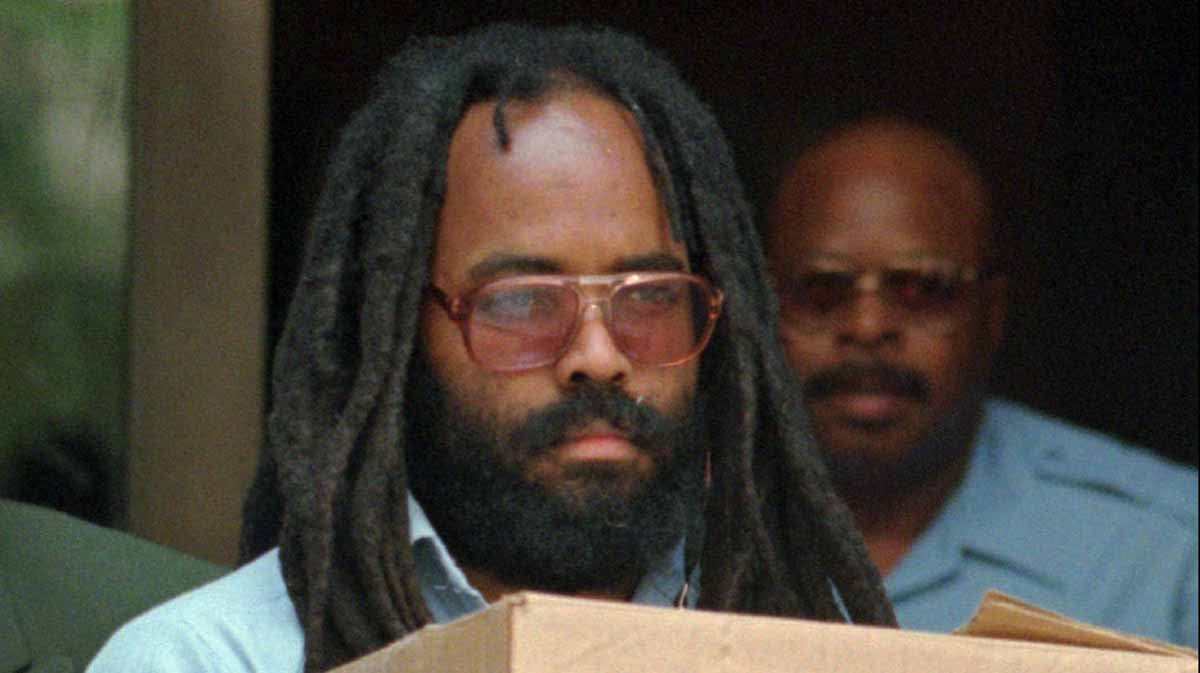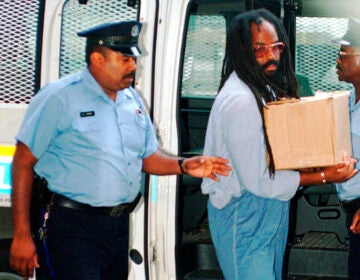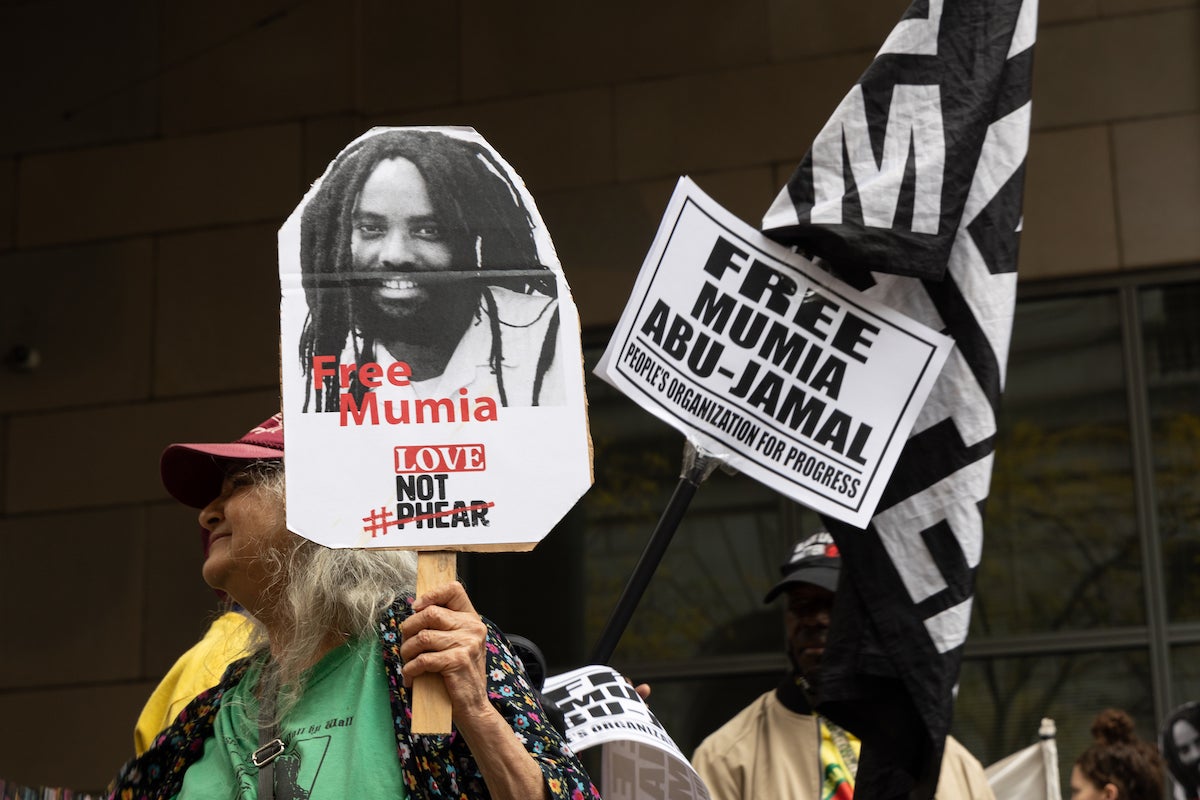Judge: Mumia Abu-Jamal can reargue appeal in 1981 Philly police slaying
Judge Leon Tucker ruled that a former justice should have recused himself because of comments he made as a prosecutor about police killers that suggest potential bias.

Mumia Abu-Jamal leaving a court hearing in 1995. (AP Photo/Chris Gardner, File)
Updated: 2:30 p.m. Friday
A Philadelphia judge has reinstated appeal rights to Mumia Abu-Jamal — convicted of killing a city police officer more than 30 years ago — who has long maintained his innocence as his case gained international attention.
Lawyers for Abu-Jamal praised the decision by Philadelphia Common Pleas Judge Leon Tucker as a major step toward winning the former Black Panther’s freedom.
“This is an unheard of legal victory,” said Rachel Wolkenstein, former lawyer and longtime activist for Abu-Jamal. “This is the best opportunity we have had for Mumia’s freedom in decades.”
Abu-Jamal has been incarcerated since his 1982 conviction for killing Philadelphia Police Officer Daniel Faulkner. He was on death row until 2011, when prosecutors dropped the execution case against him because of flawed jury instructions and instead agreed to a sentence of life in prison.
For years, Abu-Jamal’s attempts at winning a new trial were denied. In the latest legal argument, his lawyers maintained that Pennsylvania Supreme Court Justice Ronald Castille should not have presided over Abu-Jamal’s appeals battles. Castille was formerly Philadelphia’s district attorney whose office fought to keep the activist and prolific writer behind bars.
Castille refused calls from Abu-Jamal’s supporters to recuse himself from hearing the case, saying he never directly argued on the case. In his legal opinion, Tucker said Castille made the wrong decision, since even the appearance of being biased can be damaging to the judicial system.
“The claim of bias, prejudice and refusal of former Justice Castille to recuse himself is worthy of consideration as true justice must be completely just without even a hint of partiality, lack of integrity or impropriety,” Tucker wrote.
In 2012, Abu-Jamal’s advocates thought he lost his final appeal when the state Supreme Court rejected a claim challenging the validity of forensic evidence that was used to convict him.
‘We are in prison in our own minds’

Thursday’s development has breathed new life into the hopes of Abu-Jamal’s supporters that he may one day be granted freedom.
The family of officer Faulkner sees that outcome as a nightmare. They plan to plead with Philadelphia District Attorney Larry Krasner to challenge the ruling in favor of Abu-Jamal. Krasner, through a spokesman, said Thursday he was reviewing the decision and had not yet decided whether to challenge it.
“Does it affect my physically? It does. Am I sick to my stomach? Absolutely. I feel like going and throwing up,” said Maureen Faulkner, the widow of the slain officer.
“Jamal may be confined to a prison, but we are in a prison in our own mind, because we never know when we’re going to get telephone calls saying something like we heard last night,” she said on Friday.
Faulkner, who now lives in California, said she has always believed in the principle of “an eye for an eye,” saying she wishes the original sentence of capital punishment had been carried out.
“And that way, 37 years later, you do not have the family members grieving over the loss of a loved one because the case keeps coming up in court and reminding them,” she said.
Abu-Jamal filed his motion seeking a new argument in front of the Pennsylvania Supreme Court shortly after the U.S. Supreme Court ruled in 2016 that Castille improperly took part in an appeal from a death-row inmate whose prosecution he oversaw when he was the city’s top prosecutor. The defendant in that case was Terrance Williams. The U.S. Supreme Court decision in the Williams case applied to other cases Castille heard as a justice, including Abu Jamal’s.
“If a judge served as prosecutor and then the judge,” wrote Tucker, summarizing the U.S. Supreme Court ruling in the Williams case “there is a finding of automatic bias and a due process violation.”
Attorney Judith Ritter, Abu-Jamal’s lead attorney, said the judge’s reinstatement of Mumia’s right to appeal shows that the state Supreme Court was biased with the presence of Castille.
“Judge Tucker recognized the unconstitutional bias involved with Justice Castille’s sitting on the prior post-conviction appeals, and the need for a new appeal untainted by such bias,” Ritter said in a statement.
The movement to “Free Mumia” reverberated around the world over the decades, with thousands donating to his legal defense fund. Buttons and posters bearing his face became the symbols of a criminal justice system critics view as being rigged and treating African-American with indifference.
“Mumia has made the point clear from the very beginning that he is innocent,” Wolkenstein said. “This opens the door, legally, to him finally getting his freedom.”
Tucker, in his opinion, said Abu-Jamal should be given another chance to argue his innocence in front of the state’s high court, now that Castille is no longer a sitting judge.
“The court finds that recusal by Justice Castille would have been appropriate to ensure the neutrality of the judicial process in [Abu-Jamal’s appeals] before the Pennsylvania Supreme Court,” Tucker wrote.
Abu-Jamal’s lawyers now have 30 days to inform the Pennsylvania Superior Court of their intent to appeal.
Maj Tucker Op Dec 27-1 by on Scribd
WHYY is your source for fact-based, in-depth journalism and information. As a nonprofit organization, we rely on financial support from readers like you. Please give today.




